Astronomers reveal supermassive black hole's intense magnetic field
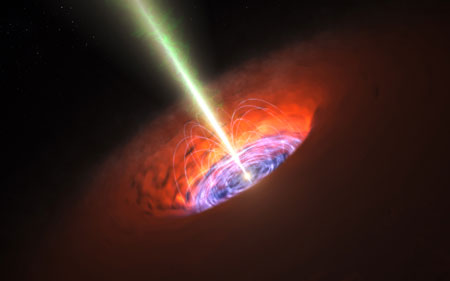 Astronomers have used the giant telescope Alma to reveal an extremely powerful magnetic field very close to a supermassive black hole in a distant galaxy.
Astronomers have used the giant telescope Alma to reveal an extremely powerful magnetic field very close to a supermassive black hole in a distant galaxy.
Apr 16th, 2015
Read more
 Subscribe to our Space Exploration News feed
Subscribe to our Space Exploration News feed
 Astronomers have used the giant telescope Alma to reveal an extremely powerful magnetic field very close to a supermassive black hole in a distant galaxy.
Astronomers have used the giant telescope Alma to reveal an extremely powerful magnetic field very close to a supermassive black hole in a distant galaxy.
Apr 16th, 2015
Read more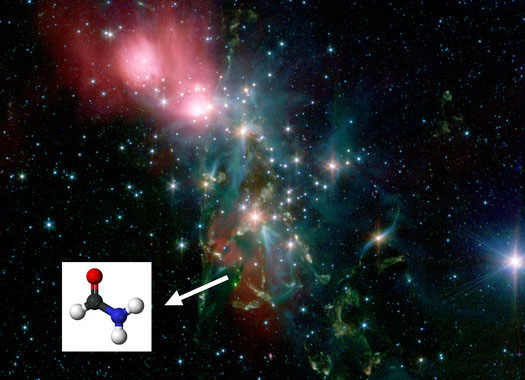 Complex organic molecules such as formamide, from which sugars, amino acids and even nucleic acids essential for life can be made, already appear in the regions where stars similar to our Sun are born. Astrophysicists have detected this biomolecule in five protostellar clouds and propose that it forms on tiny dust grains.
Complex organic molecules such as formamide, from which sugars, amino acids and even nucleic acids essential for life can be made, already appear in the regions where stars similar to our Sun are born. Astrophysicists have detected this biomolecule in five protostellar clouds and propose that it forms on tiny dust grains.
Apr 16th, 2015
Read more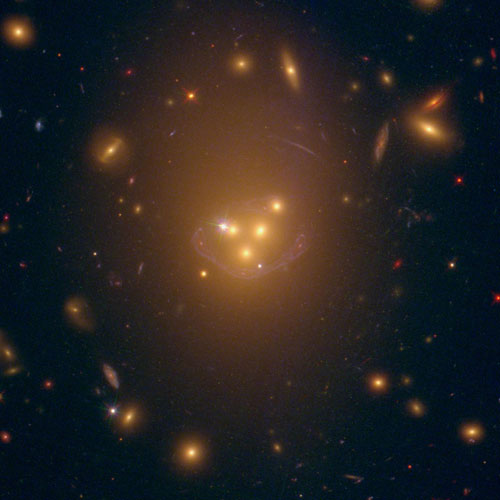 Astronomers believe they might have observed the first potential signs of dark matter interacting with a force other than gravity.
Astronomers believe they might have observed the first potential signs of dark matter interacting with a force other than gravity.
Apr 15th, 2015
Read more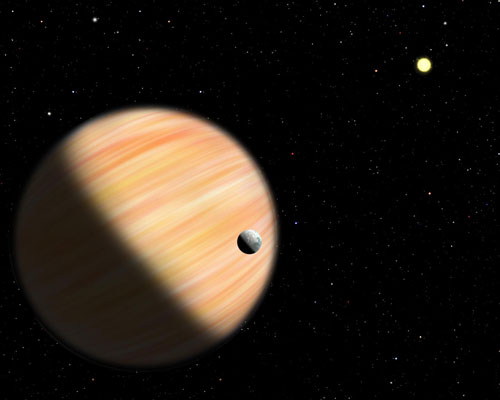 NASA's Spitzer Space Telescope has teamed up with a telescope on the ground to find a remote gas planet about 13,000 light-years away, making it one of the most distant planets known.
NASA's Spitzer Space Telescope has teamed up with a telescope on the ground to find a remote gas planet about 13,000 light-years away, making it one of the most distant planets known.
Apr 15th, 2015
Read more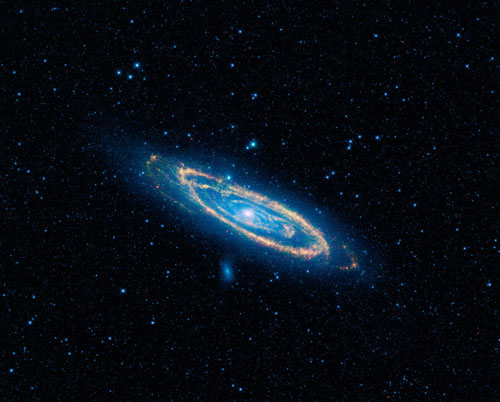 After searching 100,000 galaxies for signs of highly advanced life, a team of scientists using observations from NASA's WISE satellite has found no evidence of advanced civilizations there. The idea behind the research is that, if an entire galaxy had been colonized by an advanced spacefaring civilization, the energy produced by that civilization's technologies would be detectable in mid-infrared wavelengths.
After searching 100,000 galaxies for signs of highly advanced life, a team of scientists using observations from NASA's WISE satellite has found no evidence of advanced civilizations there. The idea behind the research is that, if an entire galaxy had been colonized by an advanced spacefaring civilization, the energy produced by that civilization's technologies would be detectable in mid-infrared wavelengths.
Apr 14th, 2015
Read more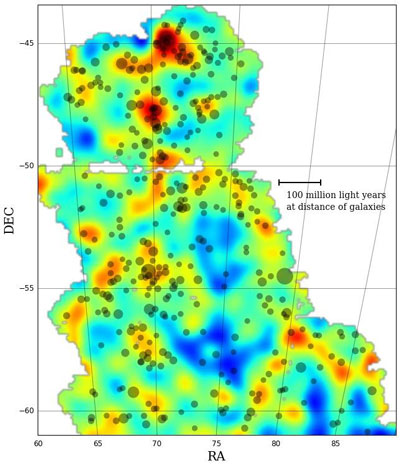 Analysis will help scientists understand the role that dark matter plays in galaxy formation.
Analysis will help scientists understand the role that dark matter plays in galaxy formation.
Apr 14th, 2015
Read more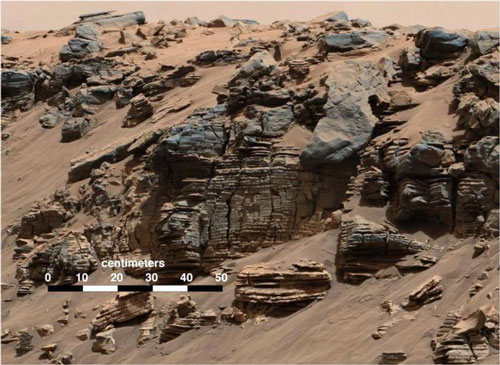 Researchers have long known that there is water in the form of ice on Mars. Now, new research from NASA's Mars rover Curiosity shows that it is possible that there is liquid water close to the surface of Mars. The explanation is that the substance perchlorate has been found in the soil, which lowers the freezing point so the water does not freeze into ice, but is liquid and present in very salty salt water - a brine.
Researchers have long known that there is water in the form of ice on Mars. Now, new research from NASA's Mars rover Curiosity shows that it is possible that there is liquid water close to the surface of Mars. The explanation is that the substance perchlorate has been found in the soil, which lowers the freezing point so the water does not freeze into ice, but is liquid and present in very salty salt water - a brine.
Apr 13th, 2015
Read more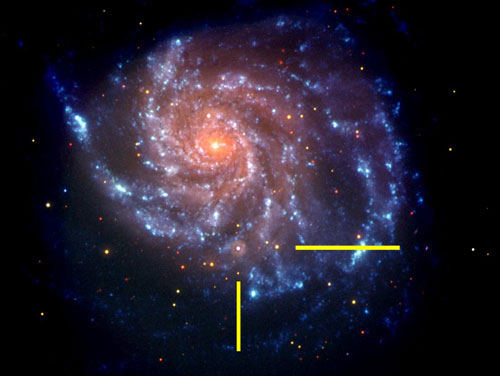 A team of astronomers found that the type of supernovae commonly used to measure distances in the universe fall into distinct populations not recognized before; the findings have implications for our understanding of how fast the universe has been.
A team of astronomers found that the type of supernovae commonly used to measure distances in the universe fall into distinct populations not recognized before; the findings have implications for our understanding of how fast the universe has been.
Apr 12th, 2015
Read moreAs part of the PlanetS National Centre of Competence in Research (NCCR), astronomers have come to measure the temperature of the atmosphere of an exoplanet with unequalled precision, by crossing two approaches.
Apr 10th, 2015
Read moreFinding sets the stage for discoveries from the next generation of neutrino telescopes.
Apr 10th, 2015
Read more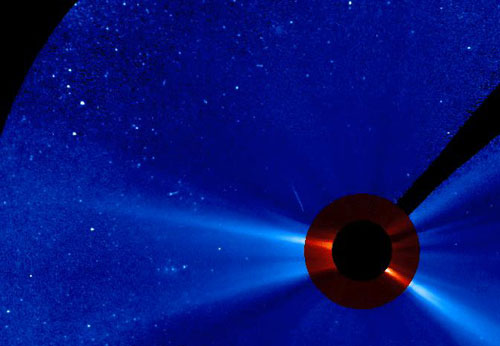 While no one yet knows what's needed to build a habitable planet, it's clear that the interplay between the sun and Earth is crucial for making our planet livable - a balance between a sun that provides energy and a planet that can protect itself from the harshest solar emissions.
While no one yet knows what's needed to build a habitable planet, it's clear that the interplay between the sun and Earth is crucial for making our planet livable - a balance between a sun that provides energy and a planet that can protect itself from the harshest solar emissions.
Apr 10th, 2015
Read more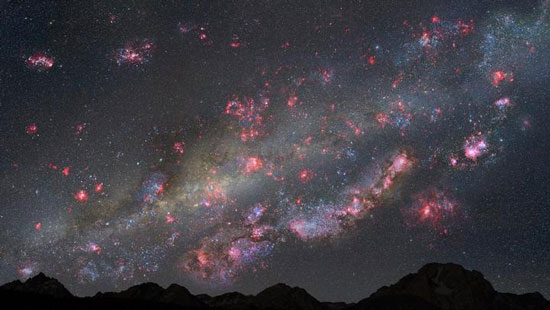 In one of the most comprehensive multi-observatory galaxy surveys yet, astronomers find that galaxies like our Milky Way underwent a stellar 'baby boom', churning out stars at a prodigious rate, about 30 times faster than today.
In one of the most comprehensive multi-observatory galaxy surveys yet, astronomers find that galaxies like our Milky Way underwent a stellar 'baby boom', churning out stars at a prodigious rate, about 30 times faster than today.
Apr 10th, 2015
Read moreWhen black holes tango, one massive partner spins head over heels (or in this case heels over head) until the merger is complete, said researchers.
Apr 9th, 2015
Read more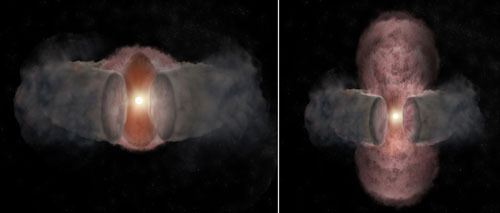 Astronomers are getting a unique, real-time look as a massive young star develops, with the promise of greatly improved understanding of the process.
Astronomers are getting a unique, real-time look as a massive young star develops, with the promise of greatly improved understanding of the process.
Apr 2nd, 2015
Read more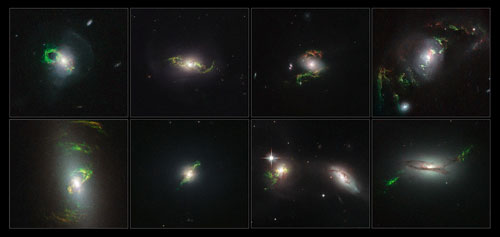 The Hubble Space Telescope has imaged a set of enigmatic quasar ghosts - ethereal green objects which mark the graves of these objects that flickered to life and then faded. The eight unusual looped structures orbit their host galaxies and glow in a bright and eerie goblin-green hue. They offer new insights into the turbulent pasts of these galaxies.
The Hubble Space Telescope has imaged a set of enigmatic quasar ghosts - ethereal green objects which mark the graves of these objects that flickered to life and then faded. The eight unusual looped structures orbit their host galaxies and glow in a bright and eerie goblin-green hue. They offer new insights into the turbulent pasts of these galaxies.
Apr 2nd, 2015
Read more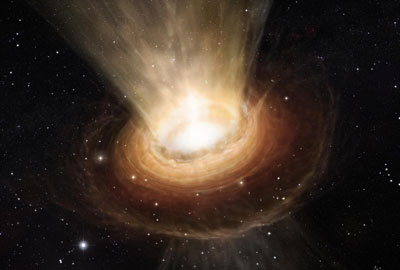 Some physicists have argued that black holes are the ultimate vault, sucking in information and then evaporating without leaving behind any clue as to what they once contained. A new study shows this perspective may be wrong. The research finds that information is not lost once it has entered a black hole, and presents explicit calculations showing how information is, in fact, preserved.
Some physicists have argued that black holes are the ultimate vault, sucking in information and then evaporating without leaving behind any clue as to what they once contained. A new study shows this perspective may be wrong. The research finds that information is not lost once it has entered a black hole, and presents explicit calculations showing how information is, in fact, preserved.
Apr 2nd, 2015
Read more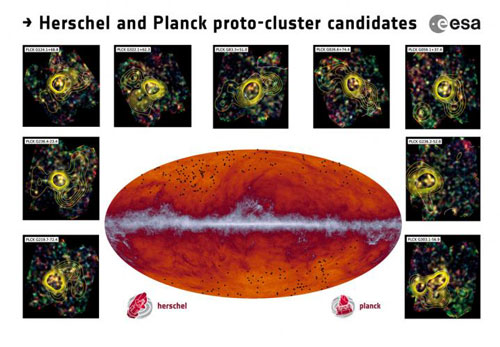 Observations made with two space observatories, Herschel and Planck, reveal glimpses into how today's galaxies came to be.
Observations made with two space observatories, Herschel and Planck, reveal glimpses into how today's galaxies came to be.
Mar 31st, 2015
Read more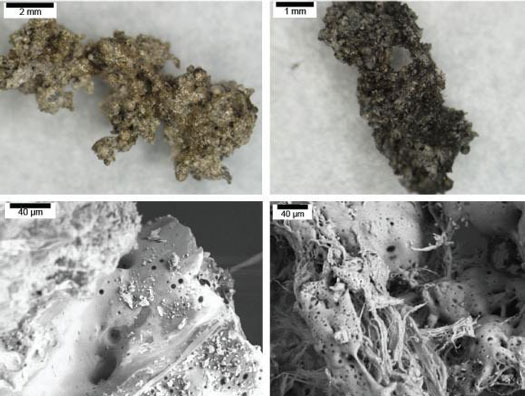 A team of scientists has a new explanation for the planet Mercury's dark, barely reflective surface. They suggest that a steady dusting of carbon from passing comets has slowly painted Mercury black over billions of years.
A team of scientists has a new explanation for the planet Mercury's dark, barely reflective surface. They suggest that a steady dusting of carbon from passing comets has slowly painted Mercury black over billions of years.
Mar 30th, 2015
Read more